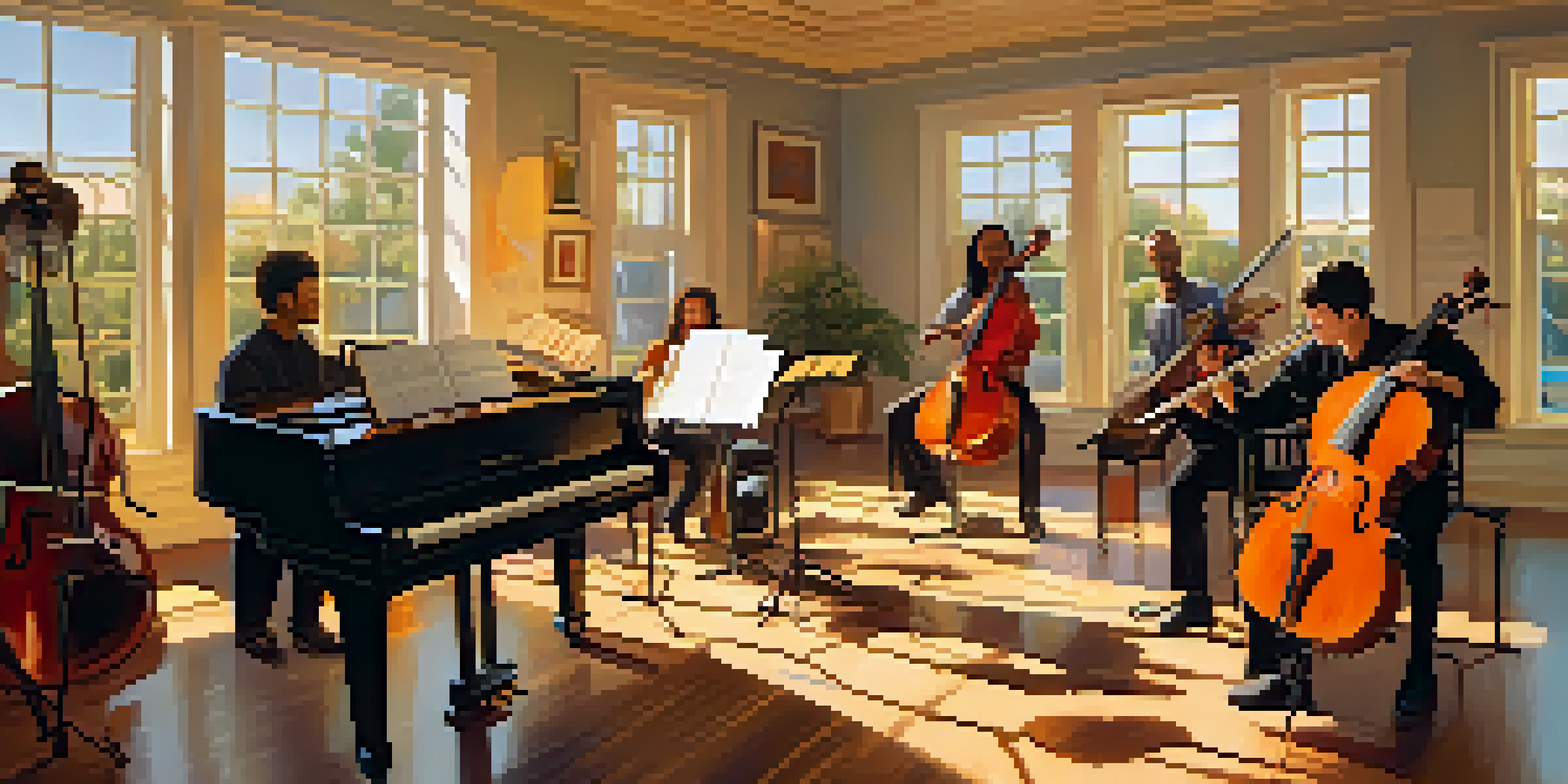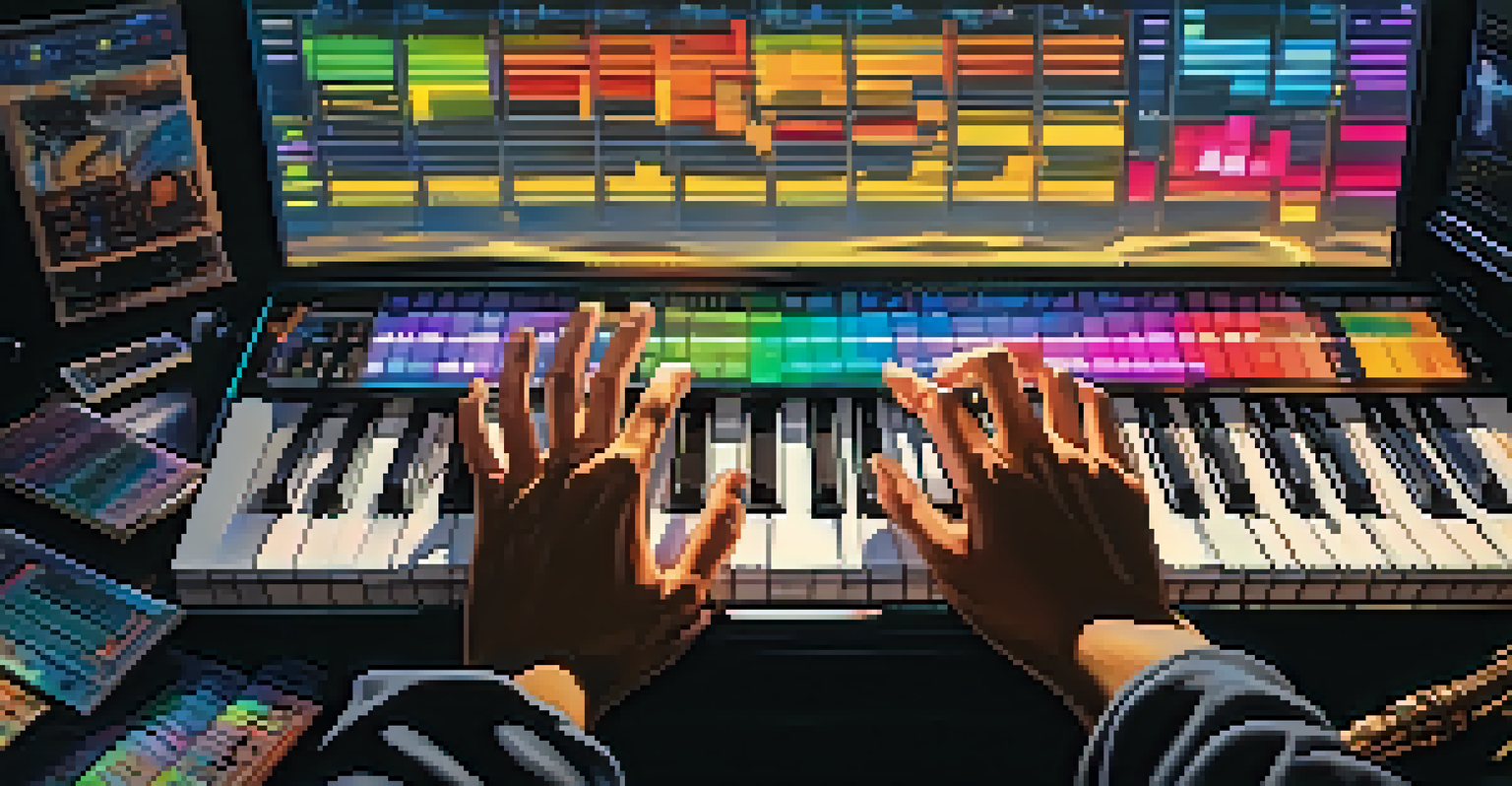The Art of Soundtrack Composition in Film Production

Understanding the Role of Soundtracks in Film
Soundtracks play a crucial role in film, enhancing emotions and storytelling. They create an auditory backdrop that complements visual elements, drawing audiences deeper into the narrative. Imagine watching a suspenseful scene without the accompanying music—much of the tension would dissipate, right?
Music can change the world because it can change people.
A well-composed soundtrack can evoke specific feelings, from joy to sorrow, and can even signal character development. Think about iconic films; their soundtracks often linger in our minds long after the credits roll. This is no accident; composers carefully craft soundscapes to resonate with viewers.
Ultimately, soundtracks are more than just background noise; they're an integral part of the filmmaking process. They help to set the tone, pace, and mood, creating an immersive experience that shapes how we perceive the story.
Key Elements of Soundtrack Composition
When composing a soundtrack, several key elements come into play, including melody, harmony, rhythm, and instrumentation. Each of these components contributes to the overall feel of the music and, by extension, the film itself. For instance, a fast tempo can create excitement, while a slower beat might evoke reflection.

Melody often carries the emotional weight of a piece, while harmony supports and enhances it, adding depth. Think of a film's main theme; it’s usually catchy and memorable, anchoring the audience's emotional response. This is why composers often revisit themes throughout a film to reinforce connections.
Soundtracks Enhance Film Emotion
Soundtracks are crucial in amplifying emotions and storytelling, drawing audiences deeper into the film's narrative.
Additionally, the choice of instruments can significantly influence the mood. A haunting piano might convey melancholy, while a brass section could evoke a sense of triumph. By selecting the right mix of sounds, composers can paint a rich audio picture that enhances the film's narrative.
The Process of Scoring a Film
Scoring a film is a collaborative process involving directors, producers, and composers. Initially, the composer watches rough cuts of the film to understand its emotional arc and key moments. It's like getting to know a story before putting pen to paper—context is everything.
Without music, life would be a mistake.
Once familiar with the film, the composer begins sketching ideas, often starting with themes for major characters or pivotal scenes. This phase is highly creative, involving trial and error as different musical ideas are explored. It's akin to an artist choosing colors for a canvas, trying to find the perfect shade that captures the mood.
After the initial compositions are refined, they are recorded with musicians. This collaborative effort can lead to unexpected discoveries, much like a jam session where improvisation sparks new ideas. The final score is then mixed to blend seamlessly with dialogue and sound effects, ensuring that it enhances rather than overwhelms.
The Emotional Impact of Film Music
Film music has a profound ability to evoke emotions and can even influence audience perception of characters. A villain’s theme might use dissonant chords to create discomfort, while a hero’s motif often involves uplifting melodies. This deliberate use of music guides viewers' emotional responses throughout the film.
For instance, think about the iconic score of 'Jaws.' The simple two-note motif builds tension and signals danger, even before the shark appears. This clever technique of using music to foreshadow events adds an extra layer of storytelling.
Key Elements Define Soundtrack
Essential components like melody, harmony, and instrumentation shape the overall feel and emotional impact of a film's music.
Moreover, soundtracks can serve as a form of emotional shorthand, quickly establishing feelings without the need for dialogue. When audiences hear a particular score, they may instantly recall the emotions associated with a specific scene, illustrating the power of music in film.
Famous Film Composers and Their Styles
Throughout cinematic history, certain composers have become synonymous with groundbreaking soundtracks. Think of John Williams, whose scores for films like 'Star Wars' and 'E.T.' are instantly recognizable. His ability to create memorable themes has set a standard in the industry.
Another iconic figure is Hans Zimmer, known for his innovative use of electronic sounds combined with orchestral elements. His work on films like 'Inception' and 'The Lion King' showcases how modern techniques can elevate traditional composition. Zimmer’s unique style often blends emotional depth with dramatic intensity.
These composers, among others, have created legacies that influence aspiring musicians today. Their ability to craft music that resonates with audiences is a testament to the art of soundtrack composition, showcasing the diverse styles and emotional range that can be achieved.
The Evolution of Film Scores Over Time
The landscape of film scoring has transformed significantly since the early days of cinema. Initially, silent films relied on live musicians to provide accompaniment, creating a unique experience for each screening. As sound technology evolved, so did the possibilities for composers, leading to richer, more complex scores.
In the mid-20th century, the introduction of electronic instruments began to change the game. Composers started experimenting with synthesizers and digital effects, paving the way for innovative soundscapes. This shift allowed for greater creative freedom, enabling filmmakers to explore new genres and storytelling techniques.
Film Scores Evolve with Technology
The evolution of film scoring reflects advancements in technology, allowing for innovative compositions that blend orchestral and electronic elements.
Today, film scores often incorporate a blend of orchestral and electronic elements, reflecting the diverse influences in modern music. This evolution continues to inspire new generations of composers, proving that soundtrack composition is a dynamic art form that adapts to the times.
The Future of Soundtrack Composition in Film
As technology advances, so too does the potential for innovation in soundtrack composition. With the rise of artificial intelligence and advanced software, composers have new tools at their disposal to experiment and create. This evolution could lead to entirely new sounds and methods of storytelling in film.
Moreover, streaming platforms have changed how audiences consume film music. Soundtracks are now more accessible, allowing listeners to engage with the music independently of the film. This trend encourages composers to create standout scores that can thrive in both film and concert settings.

Looking ahead, the future of soundtrack composition promises to be exciting, with limitless possibilities for creativity and collaboration. As filmmakers and musicians continue to push boundaries, we can expect soundtracks to evolve in ways we can't yet imagine, enriching the cinematic experience for generations to come.